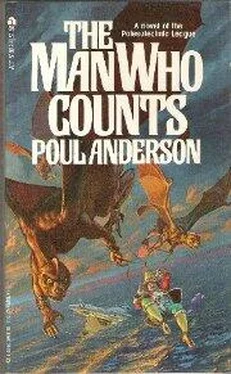The Man Who Counts
by Poul Anderson
Thinking about this early novel after a lapse of years, I believe I can see what its wellsprings are. They include the old pulp conventions of storytelling and a desire to change or, at any rate, spoof these: Falstaff, Long John Silver, and other amiable literary rogues, as well as a few real figures from the Renaissance: L. Sprague de Camp’s unique combination of humor and adventure: above all, Hal Clement’s marvelously detailed and believable fictional worlds. I do not say that The Man Who Counts matches any of its inspirers. Certainly I would write it a bit differently today. Yet it does represent my first serious venture into planet-building and the first full-scale appearance of Nicholas van Rijn. Thus I remain fond of it.
After being serialized in Astounding (today’s Analog) it had a paperback edition. The latter was badly copy-edited and saddled with the ludicrous title War of the Wing-Men. I am happy that now, at last, the proper text and name can be restored.
Planet-building is one of the joyous arts, if you have that sort of mind. The object is to construct a strange world which is at the same time wholly consistent, not only with itself but with what science knows of such matters. Any extra-scientific assumptions you make for story purposes — e.g., faster-than-light travel — should not be necessary to the world itself. So, taking a star of a given mass, you calculate how luminous it must be, how long the year is of a planet in a given orbit around it, how much irradiation that planet gets, and several more things. (Of course. I simplify here, since you ought also to take account of the star’s age, its chemical composition, etc.) These results will be basically influential on surface features of the planet, kind of life it bears, evolution of that life, and so on endlessly. There is no rigid determinism: at any given stage, many different possibilities open up. However, those which you choose will in their turn become significant parameters at the next stage… until at last, perhaps, you get down to the odor of a flower and what it means to an alien individual.
Because science will never know everything, you are allowed reasonable guesses where calculation breaks down. Nonetheless — quite apart from flaws which sharp-eyed readers may discover in your facts or logic — you can be pretty sure that eventually science will make discoveries which cast doubt, to say the very least, on various of your assumptions. History will have moved on, too, in directions you had not foreseen for your imaginary future. You are invited to play what Clement calls “the game” with this unrevised text of mine.
I was saved from making one grievous error, by my wife. Looking over my proposed life cycle of the Diomedeans, she exclaimed, “Hey, wait, you have the females flying thousands of miles each year while they’re the equivalent of seven months pregnant. It can’t be done. I know.” I deferred to the voice of experience and redesigned. As I have remarked elsewhere, planet-building ought to be good therapy for the kind of mental patient who believes he’s God.
Despite the hazards, I’ve come back to it again and again, always hoping that readers will share some of the pleasure therein.
—Poul Anderson
Grand Admiral Syranaxhyr Urnan, hereditary Commander-in-Chief of the Fleet of Drak’ho, Fisher of the Western Seas, Leader in Sacrifice, and Oracle of the Lodestar, spread his wings and brought them together again in an astonished thunderclap. For a moment, it snowed papers from his desk.
“No!” he said. “Impossible! There’s some mistake.”
“As my Admiral wills it,” Chief Executive Officer Delp hyr Orikan bowed sarcastically. “The scouts saw nothing.”
Anger crossed the face of Captain T’heonax hyr Urnan, son of the Grand Admiral and therefore heir apparent. His upper lip rose until the canine tushes showed, a white flash against the dark muzzle.
“We have no time to waste on your insolence, Executive Delp,” he said coldly. “I would advise my father to dispense with an officer who has no more respect.”
Under the embroidered cross-belts of office Delp’s big frame tautened. Captain T’heonax glided one step toward him. Tails curled back and wings spread, instinctive readiness for battle, until the room was full of their bodies and their hate. With a calculation which made it seem accidental, T’heonax dropped a hand to the obsidian rake at his waist. Delp’s yellow eyes blazed and his fingers clamped on his own tomahawk.
Admiral Syranax’s tail struck the floor. It was like a fire-bomb going off. The two young nobles jerked, remembered where they were, and slowly, muscle by muscle laying itself back to rest under the sleek brown fur, they relaxed.
“Enough!” snapped Syranax. “Delp, your tongue will flap you into trouble yet. T’heonax, I’ve grown bored with your spite. You’ll have your chance to deal with personal enemies, when I am fish food. Meanwhile, spare me my few able officers!”
It was a firmer speech than anyone had heard from him for a long time. His son and his subordinate recalled that this grizzled, dim-eyed, rheumatic creature had once been the conqueror of the Maion Navy — a thousand wings of enemy leaders had rattled grisly from the mastheads — and was still their chief in the war against the Flock. They assumed the all-fours crouch of respect and waited for him to continue.
“Don’t take me so literally, Delp,” said the admiral in a milder tone. He reached to the rack above his desk and got down a long-stemmed pipe and began stuffing it with flakes of dried sea driss from the pouch at his waist. Meanwhile, his stiff old body fitted itself more comfortable into the wood-and-leather seat. “I was quite surprised, of course, but I assume that our scouts still know how to use a telescope. Describe to me again exactly what happened.”
“A patrol was on routine reconnaissance about 30 obdisai north-north-west of here,” said Delp with care. “That would be in the general area of the island called… I can’t pronounce that heathenish local name, sir; it means Banners Flew.”
“Yes, yes,” nodded Syranax. “I have looked at a map now and then, you know.”
T’heonax grinned. Delp was no courtier. That was Delp’s trouble. His grandfather had been a mere Sail-maker, his father never advanced beyond the captaincy of a single raft. That was after the family had been ennobled for heroic service at the Battle of Xarit’ha, of course — but they had still been very minor peers, a tarry-handed lot barely one cut above their own crew-folk.
“Syranax, the Fleet’s embodied response to these grim days of hunger and uprooting, had chosen officers on a basis of demonstrated ability, and nothing else. Thus it was that simple Delp hyr Orikan had been catapulted in a few years to the second highest post in Drak’ho. Which had not taken the rough edges off his education, or taught him how to deal with real nobles.
If Delp was popular with the common sailors, he was all the more disliked by many aristocrats — a parvenu, a boor, with the nerve to wed a sa Axollon! Once the old admiral’s protecting wings were folded in death -
T’heonax savored in advance what would happen to Delp hyr Orikan. It would be easy enough to find some nominal charge.
The executive gulped. “Sorry, sir,” he mumbled. “I didn’t mean… we’re still so new to this whole sea… well. The scouts saw this drifting object. It was like nothing ever heard of before. A pair of ’em flew back to report and ask for advice. I went to look for myself. Sir, it’s true!”
Читать дальше











